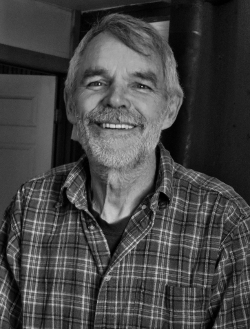 |
After high school he joined the Marines. When his father, who was an OB/GYN doctor died, David, his mother and his younger brother and sister opened Whole Earth Natural Foods in 1971.
In 1977 David left Salt Lake City to pursue his dream of being a farmer. His siblings, Molly and Steve, continued to run the store until 1985.
David ended up with a farm in Moyie Springs and put in nearly 40 years of work there. One winter in the early days of his farming career, he was given a bag of unusual potatoes. With his uncanny knack for predicting upcoming agricultural trends, he held onto the potatoes all winter studying up on the long forgotten varieties and making plans to begin multiplying them during harvest.
His crop turned out to be a bumper crop that year and Ronniger's Potato Farm was born.
He changed Idaho from a monoculture potato crop to a cornucopia of variety. David was instrumental in introducing over 200 varieties of certified organic seed potatoes and 10 varieties of fingerling potatoes. His customers were on the forefront of potato history. Ronniger's Potato Farm achieved something close to rock star status in the world of agriculture.
There are dozens of articles written about him and his farm in magazines like Martha Stewart's, the New Yorker, Rocky Mountain Gardening, Hobby Farms, Montana Health Journal, National Gardening and Harrowsmith Country Life, just to name a few.
But that's not all David is famous for.
In 1990 he got a Haflinger horse from a friend who was downsizing his own herd. The Haflinger is a small sturdy horse with a friendly nature and David used them in his fields. 15 years later David was the second largest breeder of this horse in the U.S.
David was one of the few people in the western United States who knew how to process the indigenous seeds of the area. He started off by collecting conifer seeds for Christmas tree farms across the country and soon started harvesting seeds for small trees and native shrubs.
He collected seeds in Montana, Idaho, Washington and British Colombia forests for species such as quaking Aspen, bunchberry dogwood and Rocky Mountain Maple to ensure their continued existence. He processed hundreds of thousands pounds of seeds.
David's days on the farm were long and he didn't hire much outside help. He prided himself on being self-sufficient and conscious of the environment. He would reuse and recycle. He went to auctions and rebuilt his farm equipment. He had his own sawmill and cut the lumber for the buildings that he built. He had old bikes which his workers used to get around on the farm.
The farm in Idaho is being continued by David's son Simon and family
David wrote that he "retired to Hot Springs, Montana."
During this retirement he remodeled and opened Camas Organic Market and then later added a large addition. He developed his little farm so he could provide his community and all the visitors with locally grown produce. He built a large root cellar and added a high tunnel greenhouse.
He wrote that his intention was to set a precedence in Hot Springs for this community and other communities, families and individuals to see how simply we can live and appreciate the wisdom in smallness. He believed people must learn to grow a garden, learn about nutrition and start meals from scratch. He wanted the store to be a place for people to come together and share what they are learning and growing.
"What I really want to see is an explosion of awareness," he said. "The only way to help people change their way of thinking is through education. Information is everywhere these days, but first person accounts, actually seeing how to make it happen ... that's what hits close to home."
Certainly anyone who appreciates high-quality vegetables, plants and even horses can agree that our community's produce selections and our entire nation's agricultural selections and are a lot better off because of David.